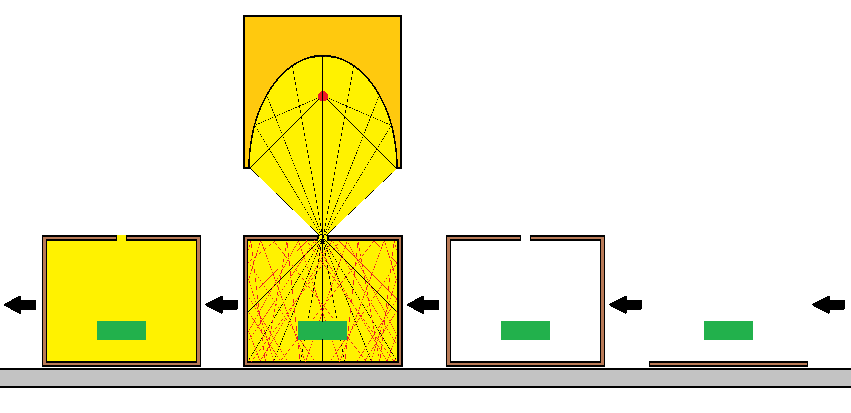INDEX
기본 원리
상자에 작은 구멍을 열고 외부에서 가열합니다.
이 가열 방법을 사용하면 간단한 구조로 고온 전기로도 제작할 수 있습니다.
조사공으로부터 투입된 광에너지는 상자 안쪽면이 반사율 100%로 하면 조사공 이외의 장소에서는 모든 광에너지를 반사합니다.
이 광에너지를 흡수하는 물체는 상자 안에 들어간 물체뿐이므로 모든 빛을 흡수하여 열에너지로 변환할 수 있다면 가열 상한인 약 1800℃에 이를 가능성이 있습니다.
적외선 흡수율이 나쁜 가열 대상물이나, 비교적 큰 물체의 가열이나, 분산 분포한 가열 대상물 등을 고효율로 고온도로 균일 가열할 수 있는 방법입니다.
이 가열 방법의 성공의 열쇠는 고반사의 상자의 제작이 전부입니다.
일반적인 ‘노’와 달리, 열원과 궤를 분리 할 수 있으므로, 벨트 컨베이어에 인라인으로 사용할 수 있습니다.
상자 가열은 가열 대상물을 출입 할 수있는 2 개의 시리얼 형 구조에 있습니다.
또한, 상자의 모양은 그림과 같은 사각형뿐만 아니라 삼각형과 구형이나 원통형 등 어떤 형태도 있습니다.
상자의 내벽은 금 도금과 같은 고 반사율의 반사가 이상적이지만, 가열 대상물에서 연기가 발생하는 경우가 있고, 고급 경면은 유지가 곤란 내일.
진공 챔버 내부를 가열
조사 구멍에 석영 유리를 사용 진공 챔버에서 가열하는 방법도 있습니다.
내부를 비산 화성 분위기에 있기 때문에 비 산화 가열 가공이 가능합니다.
또는 특수한 가스 중에서 어떤 화학 반응을시킬 수 있습니다.
특히 청정이 요구되는 전기로는 안성맞춤입니다.
노 내에 발열체가 존재하지 않기 때문에, 발열체로부터 발생하는 오염도 없어져 내부가 더러워지지 않습니다.
